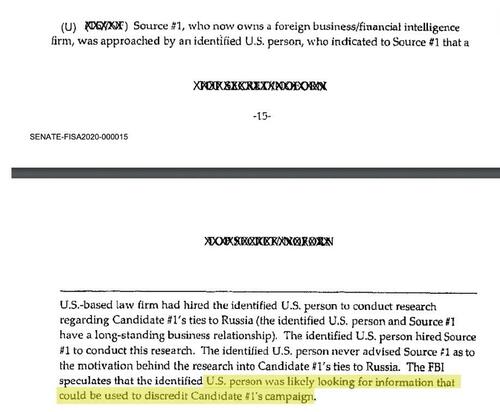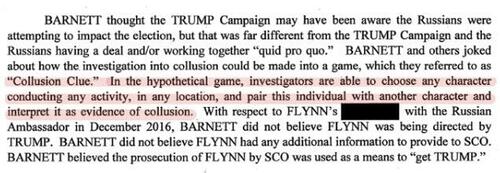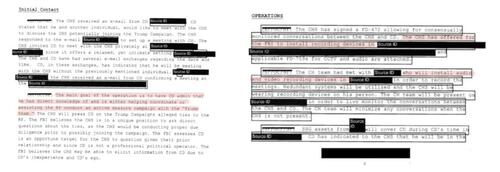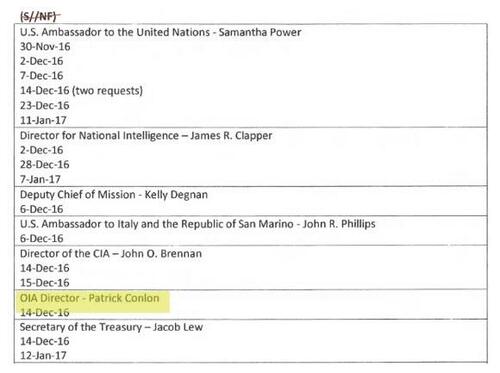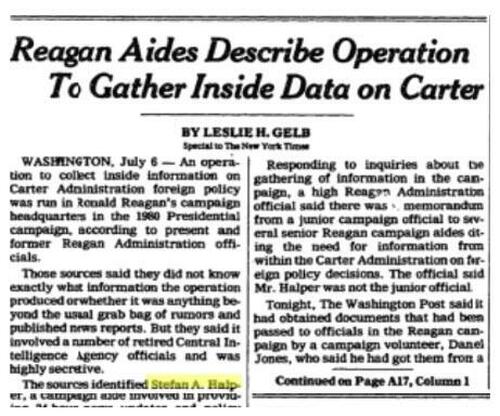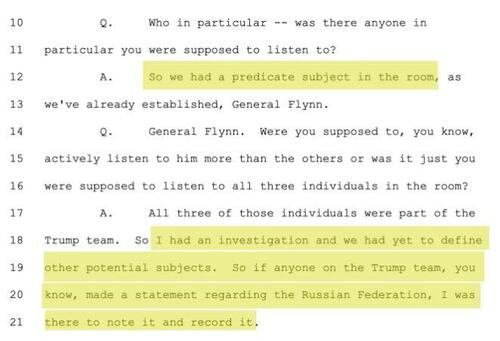Watch Live: Matt Taibbi Refutes Lesley Stahl’s Infamous Trump Surveillance ‘Eye-Roll’
Authored by Matt Taibbi via Racket News,
The flagship CBS news show still hasn’t corrected its infamous eye-roll over surveillance of Donald Trump’s 2016 campaign. The documents you need to answer this, including a Chris Christie cameo
On their YouTube page, 60 Minutes still hasn’t corrected its headline: “President Trump repeats unsupported claim about spying.” The money exchange between Donald Trump and host Lesley Stahl:
TRUMP: They spied on my campaign, Leslie.
STAHL: There’s no real evidence of that.
TRUMP: Of course there is.
STAHL: No.
TRUMP: It’s all over the place.
STAHL: Sir…
TRUMP: Leslie, they spied of my campaign and they got caught.
STAHL: Can I say something? This is 60 Minutes and we can’t put on things we can’t verify.
This is 60 Minutes and we can’t put on things that we can’t verify! Stahl said this a year after the publication of Barack Obama appointee and Justice Department Inspector General Michael Horowitz’s report on the Trump-Russia investigation that described how the FBI used “intrusive techniques,” like having informants “interact and consensually record multiple conversations” with Trump aides “both during and after the time they were working for the Trump campaign.” That Horowitz report used the term CHS, or “confidential human source” — also known as an informant, also known as a spy — 1,122 times! Stahl was chastening Trump that “we” don’t tolerate wrongness, in the middle of being obviously, provably wrong in that very moment.
It’s one thing to get stories wrong. It happens. But people like Stahl for eight years have combined being wrong with constant expressions of proud contempt for those who are not. There has to be pushback. Not for Donald Trump, but for members of the public who want to be able to better answer this sort of thing, I’ve begun putting together a list that will help direct those interested to the major public documents demonstrating the existence of the spying campaign and other abuses. I’ll also hold a livestream this afternoon at 4:00 p.m. ET to briefly summarize what’s on the list. To tune in:
For Rumble, click here.
For YouTube, click here.
Regarding the documents:
This page will be updated, even by this afternoon, so please look at the online version for the livestream. Eventually this list will replaced with a full chronological timeline (a Racket contributor is putting together a sizable package we hope to put out as a public resource), after which it’s my hope we can put this matter to bed for a while.
In the meantime, here’s a starter kit of official reports and papers describing the multitudinous angles of investigation into Trump and the Trump campaign before he took office. This includes undercover surveillance of Trump himself, the multi-layered interviews of senior advisors like General Michael Flynn, the warrant application for monitoring of former aide Carter Page, and other key documents.
It’s important to stress that it is in fact spying when you’re reporting conversations to authorities, and the other person in the room or on the phone isn’t in on the deal. This went on in several different stages prior to Trump’s election. In no particular order:
FISA warrant application for Carter Page. Most people, including perhaps even Lesley Stahl, have heard of the FBI’s application for Foreign Intelligence Surveillance monitoring of the former Trump aide. It’s concrete proof the FBI sought and received permission to conduct electronic surveillance on a campaign associate. It’s important to be able to point out what was added to this document, in particular a footnote designed to mollify an FBI attorney who didn’t like submitting a “politically sensitive” application based on paid opposition research. Read and be the judge of whether you’d know exactly what the “footnote” meant, if you were sitting in judgment:
The footnote designed to mollify attorney Stuart Evans,
Interview of Special Agent William Barnett. This interview was conducted in September, 2020, a month before the 60 Minutes piece. Barnett worked on both the FBI’s “Crossfire Hurricane” probe and the investigation of Special Agent Robert Mueller. Barnett described believing the reason for the initial probe of Trump was “opaque,” the case theory based on “supposition on supposition,” with predication that was “not great.” He describes other investigators who believed what they were doing was an “exercise in futility,” and relates how agents played a “Collusion Clue” game that spoofed that total stupidity of their investigation, the goal of the game being to take any activity in any location, pair that with any character, and “interpret it as evidence of collusion”:
“Collusion Clue.”
The “Operational Plan” memos. To be fair, these were declassified after the Stahl interview, but the information had been reported on previously. One August 24, 2016, the FBI’s ‘Crossfire Hurricane” investigative team laid out an “operational plan” for confidential human source Stefan Halper’s approach of Trump aide Carter Page. “The main goal of the operation is to have [Page] admit that he has direct knowledge of and is either helping coordinate or assisting the [Russian Federation] conduct an ‘active measure’ with the Trump team,” it reads.
It went on to say “The CH team will continue to encourage the CHS to make contact with individuals in furtherance of the investigation.” It talks about how Halper “offered for the FBI to install recording devices in [redacted]” and mentions another source who “will install audio and video recordings in [redacted] in order to record the meetings”:
From the “Operational plan.” Isn’t the use of informants spying?
The Priestap 302, and interview with former Acting National Security Director Mary McCord. Case notes for the FBI interview of Flynn, conducted to determine if he was in a “clandestine relationship with Russia,” according to notes from the interview of McCord, who also approved the infamous Page FISA. This was in the wake of an intercepted phone call between Flynn and Russian ambassador Sergei Kislyak during the transition. Again, you’ve likely heard about this, but it’s a different thing to see the paper: assistant director of Counterintelligence Bill Priestap asking in his handwritten notes if the goal of the FBI interview is “truth/admission” or “get him to lie, so we can prosecute,” or “get him fired”?
Priestap’s notes.
Unmasking requests, pre-inauguration. Courtesy first of Senators Ron Johnson and Chuck Grassley and later reporter Chuck Ross, a list of 39 requests to unmask U.S. Person identities by the likes of John Brennan and James Clapper, who “may have received Lt. General Flynn’s identity in response.” An attentive reader will spot future Twitter employee Patrick Conlon, then of the Office of Intelligence and Analysis at Treasury. I’d like to know the reason former Citigroup executive and Barack Obama buddy Jacob Lew needed to unmask a former DIA official like Flynn. This document shows that intercepts of incoming Trump officials were being looked at in the months before Trump took office.
Comey memos, Inspector General rebuke of Comey. It’s forgotten, but FBI chief James Comey didn’t just brief President-elect Trump about the “salacious” Steele dossier material in an infamous Trump Tower meeting on January 5th meeting, he felt Trump out for intelligence as part of the “Crossfire Hurricane” probe. This is explained in a brutal and under-reported Inspector General review of Comey’s conduct that concluded Comey violated government policies by keeping and sharing memos of his conversations with Trump. Why? Because “much of the content of the Memos was directly tied to FBI investigative activities,” as the IG put it. In other words, Comey was yet another source reporting on Trump to investigators, prodding him in search of a reaction and then, at the suggestion of people like Deputy Director Andrew McCabe, memorializing his interactions for possible future use.
In order to pull this off, Comey had to lie to Trump in his very first meeting, against the advice of the FBI’s General Counsel, telling him he wasn’t under investigation and that their meeting was “private” (with details leaked not just to other FBI departments but to the press, it would soon be anything but). In his awful Higher Loyalty book, Comey humorously justified his decision by lying to himself, claiming that “you’re not under investigation” could be technically true because the FBI didn’t care about whether or not the Pee/Prostitute story was true. But Trump was being investigated for espionage and election-fixing, not sex romps. Nonetheless, Comey consoled himself that “you’re not under investigation” wasn’t lying:
This was literally true. We did not have a counterintelligence case file open on him. We really didn’t care if he had cavorted with hookers in Moscow, so long as the Russians weren’t trying to coerce him in some way… The FBI’s general counsel, Jim Baker, argued powerfully that such an assurance, although true, could be misleadingly narrow: the president-elect’s other conduct was, or surely would be, within the scope of an investigation looking at whether his campaign had coordinated with Russia.
Comey’s meeting recollections.
Interview with Supervisory Special Agent. While purporting to brief then-candidate Donald Trump on potential security threats, the FBI sent an agent undercover to a Washington meeting to spy on, and record the actions of, Trump, Michael Flynn
Stefan Halper’s payment records. The main “confidential human source” used to “bump” and inform on figures like Carter Page, George Papadopoulos, and Michael Flynn was Cambridge academic Stefan Halper, who was given an award of $411,575 three days after the first story about Page leaked in the media. As noted before he was paid through a crude mail drop called the Office of Net Assessment, a Pentagon department that essentially overpays clandestine sources for research papers no one will ever read. Halper in 1983 was outed by the New York Times as part of a political espionage caper to wrest information from the Jimmy Carter campaign. Some say he wasn’t “spying” in this case, which means there’s another term for being paid nearly half a million dollars to work with the FBI to “install recording devices” and “elicit information” through undercover pretext conversations.
Interview with “Supervisory Special Agent.” While purporting to brief then-candidate Donald Trump on potential security threats, the FBI sent an agent undercover to a Washington meeting to spy on, and record the actions of, Trump, Michael Flynn, and of all people, Chris Christie.
The “defensive briefing” that wasn’t.
There are too many of these documents to list all at once now, but I wanted to get a head start before this afternoon. Check for updates, see you in a few hours!
Tyler Durden
Fri, 02/16/2024 – 15:45
via ZeroHedge News https://ift.tt/xXZhakR Tyler Durden
